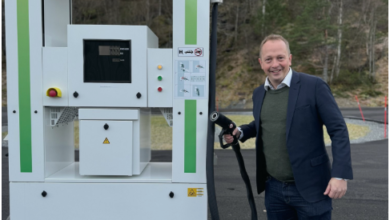Cepsa and Damas lead the first green hydrogen partnership in intercity transport in Spain

Cepsa and Damas have signed an agreement to promote the development of green hydrogen in intercity road transport and further promote sustainable mobility.
This is the first partnership of this type in Spain, and its objective is to incorporate buses powered by this sustainable fuel into the Damas fleet of vehicles, which will run on several passenger transport lines in the provinces of Seville, Huelva, and Cadiz.
Under this agreement, Cepsa will provide refueling facilities and green hydrogen, and Damas will add up to 10 buses powered by this energy to its fleet in the initial phase. These vehicles will be used on several routes geographically close to the Andalusian Green Hydrogen Valley projects. Some of these routes will be Huelva-Seville, Seville Chipiona, Seville-Camas, Seville-Tomares, Huelva-Punta Umbria, and Huelva-Puerto de Santa Maria. The first green hydrogen-powered buses are scheduled to travel these routes in 2025. In addition, both companies will consider expanding to other regions and routes.
Using green hydrogen-powered buses on these routes will prevent the annual emission of 900.000 kg of CO2.
Enrique Iglesias, director of Commercial Structuring of Cepsa‘s Hydrogen business, noted: “This agreement is an important step in our goal to boost sustainable mobility, especially to promote the medium-distance transport sector in Andalusia and Spain. We will work with Damas to advance the energy transition together and seek sustainable solutions for our customers.”
José de la Gándara, CEO of Damas, added: “This project is a very important step in our intention to incorporate CO2 emission-free vehicles into our fleet, in the search for clean and sustainable mobility”.
With this type of partnership, Cepsa is strengthening its commitment to sustainable solutions to advance in the energy transition, decarbonizing both heavy transport and industry. In its 2030 Positive Motion strategy, the company has set itself the goal of promoting the decarbonization of transportation by boosting both electric mobility and the use of green hydrogen and second-generation biofuels.
Cepsa aims to lead green hydrogen production in Spain and Portugal by 2030 with a total capacity of 2 GW. To this end, the company will establish the Andalusian Green Hydrogen Valley, which will have two production sites located in Palos de la Frontera, Huelva, and Campo de Gibraltar, Cadiz, and will position Andalusia as the largest hub in Europe in this technology.
This partnership contributes to the 2030 Agenda’s Sustainable Development Goals: Specifically, it contributes to SDG 7 (Affordable and Clean Energy), SDG 12 (Responsible Production and Consumption), and SDG 13 (Climate Action).
